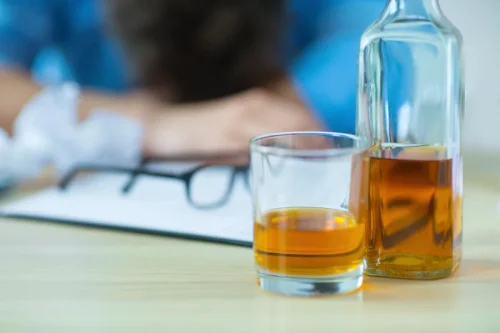How does alcohol cause weight gain? Weight loss tips

Leptin is our primary satiety hormone, which helps us feel full and satisfied after eating. You might recognize GLP-1 as the “Ozempic hormone,” another one that regulates appetite and digestion and can help with weight loss when elevated. Plus, the fact that alcohol—frustratingly—doesn’t require nutritional labeling can make it even more challenging for the average person to discern just how many calories they are consuming from their drinks. Alcohol consumption causes weight gain in some people, but this can depend on how much someone is drinking, how often, and what the rest of their lifestyle looks like (among other things). If you tend to uncork a bottle of wine each night with dinner or crack a beer as soon as it hits 5 p.m., you may wonder if these habits are causing weight gain or preventing you from losing weight.
Cancer risk
- So, if you’re trying to lose weight and improve your health, switch to a diet mostly based on whole, unprocessed foods and cut back on added sugar (42, 43, 44).
- Alcoholic beverages have “empty” calories, meaning they are high in calories and low in nutrients.
- Due to factors like hormone changes, increases in appetite, fat-burning inhibition, inflammation, and more, alcohol can definitely cause weight gain.
Your liver detoxifies and removes alcohol from your blood through a process known as oxidation. When your liver finishes that process, alcohol does alcohol make u gain weight gets turned into water and carbon dioxide. Dr. Sengupta shares some of the not-so-obvious effects that alcohol has on your body.
The case with abusive drinking
The different brew styles are made when brewers vary the grains, brewing times and flavorings they use. Beer is an alcoholic drink made from grain, such as barley, wheat or rye, that has been fermented with yeast (1). The survey also highlighted that the day after passing their tipping point, 50% of people cancel planned physical activity, often replaced with sedentary activities such as watching TV or staying in bed.
The Connection Between Alcohol and Weight Gain
These numbers are significant; alcohol is a very high-calorie product and provides 7 calories per gram. If you’d like to give us a go, click here to try our weight loss calculator to see how much you could lose with Second Nature. Heavy alcohol use is one of the leading factors in the development of obesity and chronic diseases.
- However, diets that contain low amounts of processed meats, sugary drinks and refined grain products have been linked with smaller waistlines (40, 41).
- Many mixed drinks contain a high amount of sugar that’s quickly dumped into your fat stores while your body is busy burning off the alcohol.
- ABV refers to the amount of alcohol in a 3.4-oz (100-ml) drink, expressed as a percentage.
- The morning after a night of over-imbibing can cause some temporary effects on your brain.
- Furthermore, wine provides slightly more calories than most hard liquors and light beers but usually fewer calories than heavy beers.
The day after drinking alcohol promotes weight gain for a variety of reasons. A recent animal study found that mice given ethanol over a period of three days demonstrated a significant increase in food intake. This study suggests that alcohol can actually trigger hunger signals in the brain, leading to an increased urge to eat more food. There are almost 155 calories in one 12-ounce can of beer, and 125 calories in a 5-ounce glass of red wine. By comparison, a recommended afternoon snack should have between 150 and 200 calories. A night out with several drinks can lead to consuming a few hundred extra calories.
- And from what we know, it won’t exactly hurt your weight loss journey.
- It also impedes your ability to get a good night’s sleep, further contributing to belly fat.
- Alcohol disrupts your metabolism and lowers testosterone which, in addition to the added calories, contributes to weight gain.
- This leads to a vicious cycle of weight gain and increased belly fat.

Take a 2018 study published in the journal Obesity, which examined data from 4,901 overweight or obese individuals with Type 2 diabetes who had participated in a yearslong weight loss program. One group received intensive lifestyle interventions, and was told about the number of calories in alcohol. Members of this group were advised that they could decrease drinking as a means of reducing caloric intake.
The Truth About Alcohol And Weight Gain

The effects of alcohol on opioid, serotonergic, and GABAergic pathways in the brain all suggest the potential to increase appetite [62–65]. A summary of the effects of alcohol on important appetite hormones and central neurological pathways in humans can be found in Table 2. You may have heard of the term «beer belly.» Still, the belief that alcohol causes increased fat stores around the abdominal area is inaccurate. A small percentage of the calories you drink from alcohol turns into fat. Some evidence suggests that heavy drinking may cause your adrenal glands not to regulate how much cortisol they secrete.

- Several studies suggest that consuming alcohol before or during a meal does not influence the amount of food eaten in that meal, despite increasing the energy density of the meal [5].
- I can’t thank you enough for writing this article and for putting down facts that will actually help people.
- Take a 2018 study published in the journal Obesity, which examined data from 4,901 overweight or obese individuals with Type 2 diabetes who had participated in a yearslong weight loss program.
- The effects of alcohol on opioid, serotonergic, and GABAergic pathways in the brain all suggest the potential to increase appetite [62–65].
However, despite your average drink’s seemingly significant calorie count, these beverages don’t contribute to weight gain as much as calorie-counting math suggests they should. Drinking large amounts of beer has been linked with an increased risk of weight gain and belly fat. It’s essential to be aware of both the direct and indirect effects of alcohol on your weight.
In general, all levels of alcohol intake can affect digestion and absorption of nutrients. People also tend to underestimate how much they’re drinking, Stanford says. A serving of wine, for example, is five ounces, but you probably pour more than that when you’re having a glass at home. “Whatever you think you’re having, you probably need to cut that in half,” Stanford says.

As strange as it sounds, there are times when alcohol consumption can make you even lose weight. This blog post will discuss the truth about alcohol and weight gain. While you don’t need to quit alcohol to live a healthier lifestyle, the main problem lies in binge drinking. Excessive alcohol use increases your weight and puts you at risk for long-term health complications. Increased body fat due to low testosterone levels further impairs the body’s ability to effectively produce and utilize this hormone.

